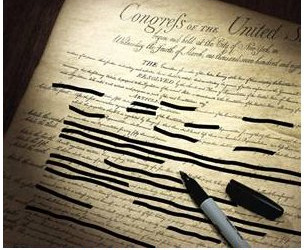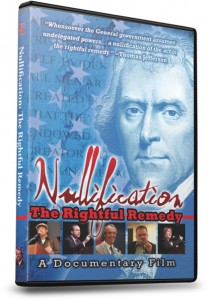 No, not because it cedes too much power to the federal government. Surely that opinion would not be allowed in the New York Times.
No, not because it cedes too much power to the federal government. Surely that opinion would not be allowed in the New York Times.
Anticipating objections, I agree with the Spoonerite criticism of the Constitution, but in what follows I am acting as a historian and a logician evaluating claims.
Georgetown University’s Louis Michael Seidman writes in the NYT:
“Our obsession with the Constitution has saddled us with a dysfunctional political system, kept us from debating the merits of divisive issues and inflamed our public discourse. Instead of arguing about what is to be done, we argue about what James Madison might have wanted done 225 years ago…. Imagine that after careful study a government official — say, the president or one of the party leaders in Congress — reaches a considered judgment that a particular course of action is best for the country. Suddenly, someone bursts into the room with new information: a group of white propertied men who have been dead for two centuries, knew nothing of our present situation, acted illegally under existing law and thought it was fine to own slaves might have disagreed with this course of action. Is it even remotely rational that the official should change his or her mind because of this divination?
The issue is not what Madison would have wanted. The point is that republican government is premised on the idea of consent. The people consented to the interpretation of the Constitution that was presented to them in the ratifying conventions. If in the interim no formal change in the Constitution has been forthcoming from the people, then the understanding that was presented at the ratifying conventions must be presumed to stand. Otherwise, professors at Georgetown University could impose their own preferences on the public instead.
As even Alexander Hamilton put it, “Until the people have, by some solemn and authoritative act, annulled or changed the established form, it is binding upon themselves collectively, as well as individually; and no presumption, or even knowledge, of their sentiments, can warrant their representatives in a departure from it, prior to such an act.”
Back to Seidman:
Constitutional disobedience may seem radical, but it is as old as the Republic. In fact, the Constitution itself was born of constitutional disobedience.
So two wrongs make a right?
No sooner was the Constitution in place than our leaders began ignoring it. John Adams supported the Alien and Sedition Acts, which violated the First Amendment’s guarantee of freedom of speech.
But because there was a First Amendment (and a Tenth Amendment; you didn’t expect Seidman to mention that it was also on Tenth Amendment grounds that dissidents objected to the Alien and Sedition Acts, did you?), it was easier to criticize Adams. The government isn’t even following its own rules, people could say.
Thomas Jefferson thought every constitution should expire after a single generation.
Not true. He mentioned an idea similar to this exactly one time, and then, when its logical problems and impracticalities were described to him, never brought it up again.
He believed the most consequential act of his presidency — the purchase of the Louisiana Territory — exceeded his constitutional powers.
In this he was virtually alone among his party, members of whom assured him that the treaty power included the power to purchase additional territory.
Seidman then lists a bunch of examples of presidents who disobeyed the Constitution. This is supposed to amount to an argument for doing so now. Couldn’t it just as easily be an argument for deciding, once and for all, to abide by the principles of republican government and actually obey the Constitution? Surely we wouldn’t say that the Soviet Union’s long list of atrocities became more legitimate over time because of customary practice.
The fact that dissenting justices regularly, publicly and vociferously assert that their colleagues have ignored the Constitution — in landmark cases from Miranda v. Arizona to Roe v. Wade to Romer v. Evans to Bush v. Gore — should give us pause. The two main rival interpretive methods, “originalism” (divining the framers’ intent) and “living constitutionalism” (reinterpreting the text in light of modern demands), cannot be reconciled.
They cannot be reconciled. That is true. Could one of them be right and the other wrong? This possibility Seidman does not consider. In which of the ratifying conventions were the people told that they would be governed by judges’ subjective decisions as to how the Constitution ought to be adapted to “modern demands”? Nowhere. Therefore, this theory is at odds with republican government, and thus the existence of competing theories does not mean that application of constitutional principles to current issues is a hopeless task. It means some people are right and others wrong, as in any other field of endeavor.
Note, too, how Seidman describes originalism with the word “divining,” as if in order to figure out that most decisions were intended to be left to the states we would need tea leaves, Tarot cards, or sheep entrails.
Our sometimes flagrant disregard of the Constitution has not produced chaos or totalitarianism; on the contrary, it has helped us to grow and prosper.
One might cite the incarceration of the Japanese, the sedition decisions after World War I, and other obvious cases, or even the civil-liberties problems of today, but “helped us to grow and prosper”? FDR, who scarcely even pretended to follow the Constitution, gave us the slowest recovery from a depression in U.S. history. The post-Civil War growth in the U.S. economy was the most robust ever, and most Americans can barely name two of the presidents from that period.
This is not to say that we should disobey all constitutional commands. Freedom of speech and religion, equal protection of the laws and protections against governmental deprivation of life, liberty or property are important, whether or not they are in the Constitution. We should continue to follow those requirements out of respect, not obligation.
So it would be better not to have written rules for government in these cases, and just rely on our wise leaders’ good judgment? If we’re going to have a federal government, I’d rather have explicit rules governing its behavior, since when it violates those rules an important pedagogical moment presents itself to us: see, the thing won’t even obey its own rules. What does that tell you about this institution?
The president would have to justify military action against Iran solely on the merits, without shutting down the debate with a claim of unchallengeable constitutional power as commander in chief.
Seidman has been a constitutional law professor for 40 years (which explains a lot), and he actually thinks the issue of presidential war powers is debatable, or that it’s the Constitution that is causing our problems when the president asserts robust powers over foreign policy. He is saying that if only we could get the Constitution behind us, we could have a discussion about this issue. To the contrary, it is the Constitution and the whole testimony of American history through the mid-20th century that stand against the president. See my treatment of presidential war powers.
OK, that’s all I can do.
- The Great Gold Robbery of 1933 - April 5, 2020
- The Two Paragraphs the So-Called Legal Experts are Keeping from You - November 19, 2018
- The Constitution and War Powers: Not a Presidential Dictatorship - April 9, 2018

